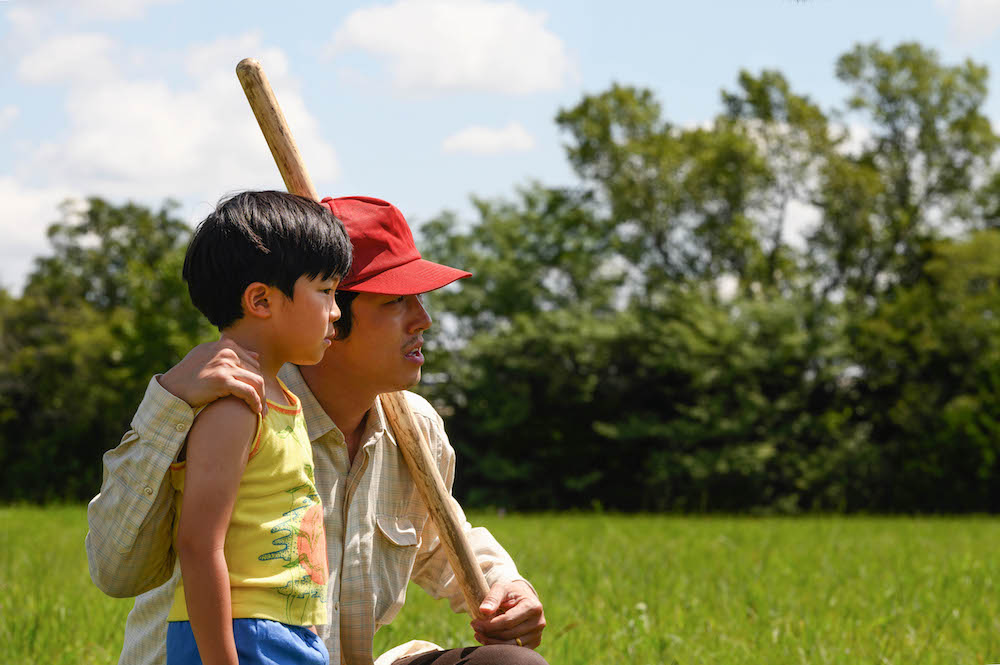A lesser version of Minari would make this a racial parable, and wouldn’t be unjustified in doing so. The Yi’s are the only Asian-descended family for miles, and their difference isolates them. That aspect exists in Minari, especially as regards the oblivious children that Anna and David encounter. Chung adds a rural/urban divide, with the religiosity and credulity of the community putting the more rational Jacob in an arrogant place. This is a flipping of a cinematic dynamic, where the outside is often the supplicant to a new community. Jacob Yi is nobody’s supplicant, especially when his first encounter with a water diviner who wants charge hundreds of dollars by waving a stick around to determine where the well should be dug. Will Patton’s Paul, a friendly and eccentric man, comes around looking for work which Jacob has plenty of, but it takes time for the family to grow accustomed to a man who can be seen on the roads every Sunday, carrying an actual cross. The Yi’s have to decide if fitting in here is something that’s even desirable. Chung’s depiction of the townspeople is a stutter step for Minari, such that he’s both creating caricatures these dual first impressions while also engaging in a head-slapping reversal in the film’s final moments.
Where Minari is largely unimpeachable is in the dynamic between David and his grandmother. Youn won a well-deserved Oscar for a role that is the kind of warm elderly performance that the Academy often showers praise on, while also anchoring the character in a true place thanks to Chung’s honest writing. Initially resistant to an old woman who, per David, smells like Korea, David soon finds that he’s not going to get the better of a woman who laughs off his pranks and wears him down. There’s an inevitability to the breakthrough they share, and it nonetheless works. Minari’s melodrama rears its head in their specific realm with an inopportune health crisis, but everything before it feels exactly right, like the viewer is spying on this family through a trailer window. What also feels true regarding the kids is the way the film back-burners Anne. Some of that might be Korean patriarchal society and some might be David’s heart condition demanding more attention, but the character’s smart enough to recognize that though she’s older, she’s the number two child in the Yi house.
Between the parents, Yeun and Han are both excellent in depicting a marriage that’s being put under heavy stress. Monica wasn’t fully sold when she agreed to the move and every new person they meet or new development on the farm moves her more firmly into the ‘this was a mistake’ corner. Both she and Jacob spend a lot of time looking at the smokestack at the chicken factory, where the male chicks end up, and Jacob equates failure with going up the smokestack. He will not be culled, and his determination makes him hard and hunched, with little time for his family. Yeun has to break out a new side of himself as a stern authority figure, and he locates a father-specific tone of voice that he can turn on and off with ease. With Han, he has a brittle rapport that can say a lot without words, particularly in a non-sexual intimate scene of Monica bathing Jacob after a particularly tough day.
Minari makes a few frustrating choices that keep it out of the highest brackets, but Chung’s film is otherwise successful at bringing some part of his childhood to vivid life. There’s something here about living a life committed to taking risks, where the Yi family is aiming big with the farm and playing it very safe with David’s health. Full commitment to a non-conservative lifestyle is what’s required for success, a piece of knowledge that Chung might’ve gleaned from his life as an artist. If Minari is what comes of holding nothing back, then there’s something to that philosophy. B+

 RSS Feed
RSS Feed